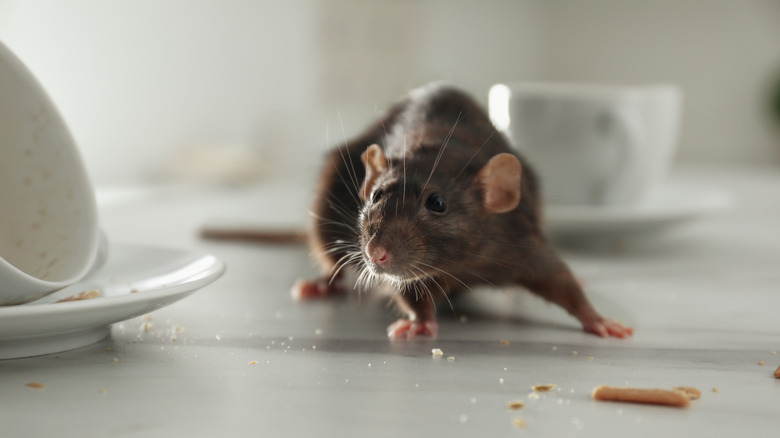Don't Fall For This Age-Old Myth To Get Rid Of Mice And Rats
If there's any group of animals in history that have arguably had one of the biggest influences on us, it's rodents, specifically house mice and rats. These skittering creatures are responsible for spreading illnesses and causing a midnight scream while attempting to swipe a treat from the fridge. While plenty of people willingly keep rodents as pets, the rest of us would much rather they stay far away from us. Rats infiltrate our homes, eat our food, and we've had just about enough of them. That's why we all grew up hearing that mothballs are the key to chasing mice away from the premises. Just let loose a few of those round, white pesticides and watch the furry creatures scamper away with fear and trembling, they said. Unfortunately, they were wrong. Mothballs might deter some flying insects, but they don't repel rodents.
This age-old myth has since been debunked, so you don't have to go wasting your money purchasing bags of mothballs if you have a rat problem. The active ingredient in mothballs is naphthalene. Naphthalene works by preventing red blood cells from being oxygenated which would affect respiration and shut the body down. The real kicker is that there is so little of this active ingredient in mothballs that it doesn't affect mice. However, you can find other solutions to your pesky rodent problems that would actually work.
Effective ways to deter rodents
Mothballs contain about half a gram to 5 grams of naphthalene,which it releases into the surrounding air — not enough to kill rodents, but enough to make yourself and your kids sick if mishandled (via the National Library of Medicine). In order to make them effective against mice and rats, you'd need a lot more naphthalene. This would have a horrible effect on anyone living in your household as well, so it's a no-no. There may be more than one way to kill a rat, but mothballs aren't one of them. Getting rid of rats and mice in a humane way is achievable through traps, adopting a cat, and cutting off their food sources and entry points.
You can set up live traps that include large buckets with bait inside and sticky traps. Once you catch them, you can then decide what to do with them. Additionally, getting a cat isn't a bad option either. Cats are hunters, and they are territorial for the most part. They won't stand to see mice around without chasing them down. You can also use very strong duct tape to seal off any holes and cracks in the wall where these small pests can squeeze through. If they can't enter, then they will head elsewhere. Also, keep your home clean and free of loose food material. This means packing food away in containers that the rats can't access. If the living conditions aren't favorable for them, they'll look for their dinner somewhere more welcoming.

